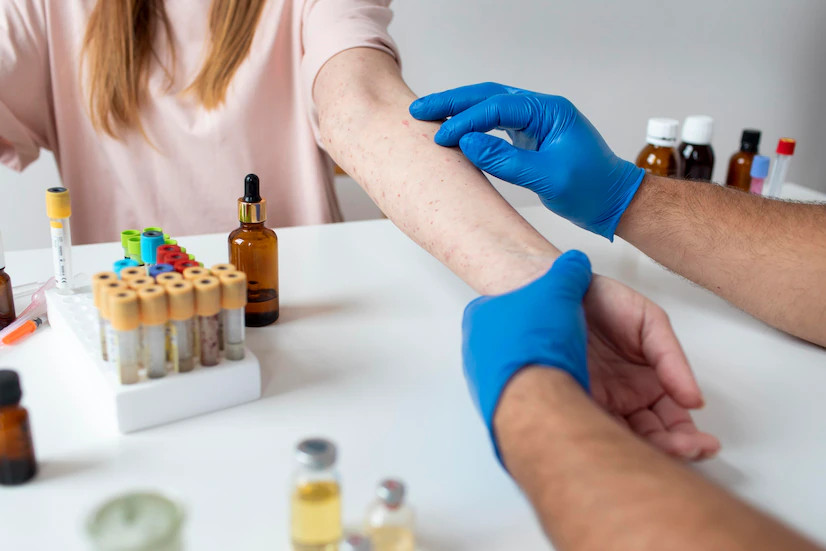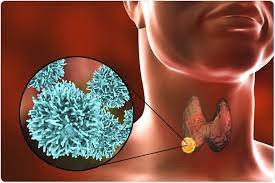Definisi
Pemeriksaan T3 adalah pemeriksaan untuk mengukur kadar T3 (triiodothyronine) di dalam darah. Pemeriksaan T3 dapat membantu untuk menegakkan diagnosis terkait dengan penyakit tiroid, khususnya kondisi hipertiroidisme.
Tiroid merupakan kelenjar yang berbentuk seperti kupu-kupu dan terletak di bagian depan bawah leher. Kelenjar tiroid berperan untuk menghasilkan hormon yang mengatur proses metabolisme di dalam tubuh. Hormon yang diproduksi adalah T3 (triiodothyronine) dan T4 (thyroxine), kedua hormon ini berkerja sama dalam mengatur suhu tubuh, berat badan, dan detak jantung.
T3 memiliki 2 bentuk, yaitu:
- T3 bebas, bentuk ini tidak terikat pada protein dan dapat bersirkulasi dengan bebas ke seluruh tubuh
- T3 terikat, bentuk ini merupakan bentuk T3 yang paling banyak di tubuh. T3 terikat dengan protein dan membantu mengedarkan hormon ke seluruh tubuh
Pemeriksaan T3 umumnya merupakan pemeriksaan T3 total, yang memeriksa baik T3 terikat maupun T3 bebas. Pemeriksaan ini dapat dilakukan bersamaan dengan pemeriksaan T4 dan TSH (Tiroid Stimulating Hormone).
Indikasi
Pemeriksaan ini biasanya dikerjakan pada beberapa kondisi sebagai berikut, yaitu:
- Untuk membantu penegakkan diagnosis penyakit kelenjar tiroid
- Untuk membantu menilai apakah ada kelainan fungsi kelenjar tiroid apabila terdapat gejala dan tanda tertentu
- Untuk memantau perkembangan penyakit setelah pemberian regimen pengobatan
- Untuk penapisan atau skrining pada orang yang berisiko tinggi terkena penyakit tiroid (terutama pada anggota keluarga yang memiliki riwayat penyakit tiroid)
Baca Juga: Penyakit Tiroiditis - Definisi, Penyebab, Gejala, dan Tata Laksana | AI Care (ai-care.id)
Kontraindikasi
Tidak ada kontraindikasi atau kondisi yang membuat seseorang tidak bisa melakukan pemeriksaan ini.
Persiapan Sebelum Pemeriksaan
Tidak ada persiapan khusus sebelum melakukan pemeriksaan T3. Pemeriksaan ini bisa dilakukan dalam keadaan tidak berpuasa. Meskipun demikian, Anda disarankan untuk melakukan konsultasi medis terlebih dahulu kepada dokter sebelum melakukan pemeriksaan T3, karena ada beberapa kondisi tertentu yang dapat menganggu hasil laboratorium sehingga tidak menggambarkan kondisi Anda yang sesungguhnya.
Prosedur Pemeriksaan
Pemeriksaan T3 umumnya menggunakan sampel serum darah sebanyak 0,25 - 0,5 ml. Sampel serum darah ini diambil dari pembuluh darah vena dan akan dikumpulkan ke dalam tabung khusus. Petugas laboratorium akan memakai sarung tangan khusus dan APD (Alat Pelindung Diri) saat mengambil sampel pemeriksaan.
Sebelum mengambil darah, petugas akan memasang pita elastis dan membersihkan area penusukan jarum dengan kasa antiseptik. Biasanya petugas mengambil darah di area lipatan siku. Setelah darah diambil dan dimasukkan ke dalam tabung khusus, petugas akan melepas pita elastis yang terpasang, menekan dan membersihkan area penusukan dengan kasa antiseptik.
Prosedur pemeriksaan ini hanya berlangsung selama beberapa menit saja. Sampel darah yang telah didapatkan akan diperiksakan menggunakan alat khusus di laboratorium, dan hasilnya bisa diketahui dalam beberapa jam kemudian.
Nilai Normal dan Abnormal
Rentang nilai normal pemeriksaan T3 umumnya dibedakan berdasarkan usia. Secara umum, berikut ini merupakan nilai normal pada hasil pemeriksaan T3.
|
Usia |
Nilai (ng/dL) |
|
1-5 tahun |
106 - 203 |
|
6-10 tahun |
104 - 183 |
|
11-14 tahun |
68 - 186 |
|
15-17 tahun |
71 - 175 |
|
18-99 tahun |
79 - 165 |
Berdasarkan tabel di atas dapat diketahui bahwa kadar T3 dalam darah memiliki nilai rentang normal dengan batas atas dan bawah yang bervariasi sesuai dengan usia. Kadar T3 darah dianggap tidak normal bila hasilnya lebih rendah atau lebih tinggi dari rentang nilai normal yang tercantum pada tabel.
Meskipun demikian, setiap laboratorium memiliki rentang nilai yang sedikit berbeda antara satu laboratorium dengan laboratorium lainnya. Hal ini terjadi karena perbedaan alat atau mesin yang digunakan.
Baca Juga: Pemeriksaan Pemeriksaan FT4 - Indikasi, Prosedur, dan Hasil Pemeriksaan | AI Care (ai-care.id)
Hasil dan Saran (Pemeriksaan Lanjutan)
Rendah
Jika hasil pemeriksaan T3 Anda menunjukkan nilai rendah, kemungkinan Anda memiliki kondisi hiportiroidisme. Meskipun demikian, pemeriksaan T3 sebaiknya diikuti juga dengan pemeriksaan T4 dan TSH agar dapat dipahami sepenuhnya mengenai kondisi medis yang terjadi.
Terdapat beberapa kondisi yang dapat menyebabkan nilai T3 rendah, di antaranya pasca operasi tiroid, terapi radiasi, kekurangan yodium, dan penyakit autoimun (seperti tiroiditis Hashimoto).
Meskipun nilai T3 Anda menunjukkan nilai yang rendah, Anda tidak disarankan untuk melakukan diagnosis medis sendiri sehingga perlu datang ke dokter untuk melakukan konsultasi dan pemeriksaan fisik apabila ada keluhan dan tanda tertentu.
Normal
Jika hasil pemeriksaan T3 Anda menunjukkan nilai normal, kemungkinan Anda telah menjalankan pola hidup sehat dengan baik dan tidak ada kelainan yang berhubungan dengan penyakit tiroid apabila tidak ada gejala dan tanda klinis tertentu.
Anda disarankan untuk tetap mempertahankan pola hidup sehat Anda saat ini sehingga dapat mencegah penyakit tiroid yang ditandai oleh nilai T3 yang terlalu tinggi atau rendah.
Tinggi
Jika hasil pemeriksaan T3 Anda menunjukkan nilai tinggi, sebaiknya Anda berkonsultasi dengan dokter karena kemungkinan Anda memiliki kondisi hipertiroidisme.
Beberapa kondisi medis yang menunjukkan kadar T3 tinggi, di antaranya penyakit Graves, tiroiditis, dan toxic nodular goiter. Pada kasus yang jarang, tingginya kadar T3 juga dapat menandakan adanya kanker tiroid atau kondisi tirotoksikosis.
Konsultasikan ke Dokter yang Tepat
Hasil pemeriksaan T3 pada orang dewasa dapat dikonsultasikan dengan dokter umum, untuk selanjutnya dilakukan pemeriksaan lanjutan ataupun memulai terapi untuk diagnosis yang sesuai. Anda juga dapat berkonsultasi dengan dokter spesialis penyakit dalam konsultan metabolik dan endokrin untuk berdiskusi mengenai masalah T3 Anda lebih jauh. Pada pasien anak, hasil pemeriksaan selain normal harus dikonsultasikan dengan dokter spesialis anak.
Mau tahu informasi seputar hasil pemeriksaan laboratorium, radiologi, dan lainnya? Cek di sini, ya!
- dr Nadia Opmalina
Triiodothronine (T3) Tests. (2021). Retrieved 28 November 2022, from https://medlineplus.gov/lab-tests/triiodothyronine-t3-tests/
T3 (Triiodothyronine) Test. (2022). Retrieved 28 November 2022, from https://my.clevelandclinic.org/health/diagnostics/22425-triiodothyronine-t3
T3 Test. (2022). Retrieved 28 November 2022, from https://www.mountsinai.org/health-library/tests/t3-test
What is a T3 Test?. (2019). Retrieved 28 November 2022, from https://www.healthline.com/health/t3
T3 Test. (2021). Retrieved 28 November 2022, from https://www.testing.com/tests/t3-test/
What to Know About T3 Levels. (2020). Retrieved 28 November 2022, from https://www.medicalnewstoday.com/articles/t3-levels
T3 (Triiodothyronine) Test. (2022). Retrieved 28 November 2022, from https://www.uclahealth.org/medical-services/surgery/endocrine-surgery/patient-resources/patient-education/endocrine-surgery-encyclopedia/t3-triiodothyronine-test
What Is a T3 Test?. (2021). Retrieved 28 November 2022, from https://www.webmd.com/a-to-z-guides/what-is-t3-test












